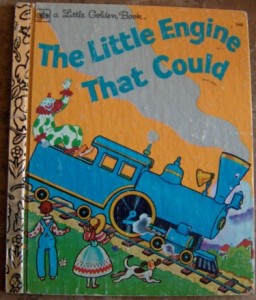Most of us remember an inspiring childrens book entitled “The Little Engine that Could.” It championed the attribute of stick-to-itiveness, even when the odds were formidable, such as having to climb over a mountain while pulling a heavy load.
Although the first published version of this story was part of a Sunday school paper in 1906, at least four authors are on record as having written it. But way back in the first part of the Old Testament, God had already authored the tale, and not just authored it but also offered to fortify our can-do effort with the strength to get a difficult job done.
In a Deuteronomy passage, Moses, the revered leader of several million people over 40 year’s time, had died just short of entering their new homeland. In these verses the people were recounting specific blessings he’d spoken to each of the 12 tribes before he passed away. He knew battles were coming and had done his best to encourage and prepare them, confident that God’s abilities exceeded those of every enemy.
Last fall, as Nate’s health made its rapid plunge toward complete incapacitation and finally death, I was fearful I wouldn’t be able to handle the unknown “mountains” ahead in caring for him. I’d heard stories of uncontrollable pain, abusive words coming from patients, horrible bathroom messes and frightening death scenes. Would I make it?
Then I opened a letter from our friend Caroline in England. Although her words of love and kindness meant a great deal, the real power was in the few words of Scripture she’d written next to her signature. They reminded me of the little blue engine who eagerly wanted to succeed, even after others had failed, others who were better suited for the job than he was.
I felt ill-suited for my job, too, but I wanted to succeed, to be everything Nate needed me to be, no matter how distasteful, agonizing or sad it became. And most of all I wanted to remain single-minded to the very end, putting Nate ahead of everything else. But I had no idea how I would have the know-how or strength to conquer whatever might come.
But amazingly, as each day passed, the Lord supplied whatever was needed, enabling me to say, “I think I can. I think I can.” God astounded us again and again with his creative provisions, never running out of new ways to come to our aid. And there isn’t any set of crisis-circumstances God can’t handle. He is the enabler; we are the I-think-I-cans.
At the end of the story of “The Little Engine that Could,” the blue train slides with ease and joy along the track on the down-side of the mountain, having done what the other engines thought was impossible. Smiling at his accomplishment, he says, “I thought I could. I thought I could.”
And that’s where our storyline breaks from that of the blue engine. Although we, too, look back with amazement, we’re looking at God’s accomplishments, not our own. It’s “We knew God could. We knew God would.”
“As your days, so shall your strength be. The eternal God drives out the enemy before you.” (Deuteronomy 33:25b,27b)



